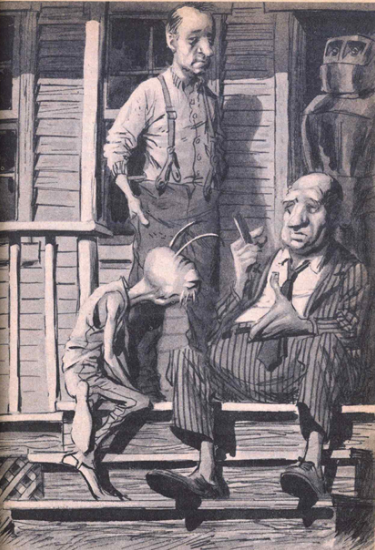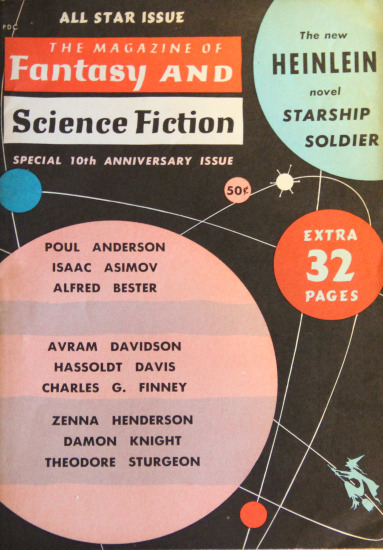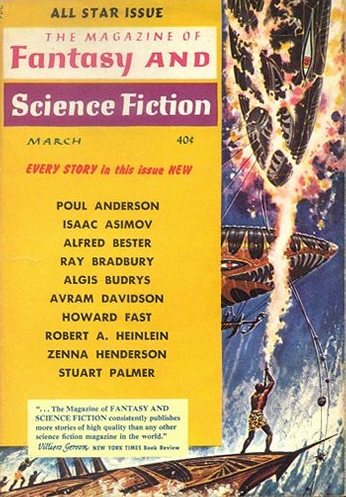
Here's a question I've gotten more than once: what is the point in spotlighting woman writers? Shouldn't I simply point out the good stories as I find them, and if they happen to be written by women, bully for them? Why should I create an artificial distinction?
Those are actually fine questions, about which I've given much thought. I make no claims to being an expert, or even someone whose opinion should matter much to you. All I have is my taste, my gut and (lucky for me) my own column in which to voice my opinions. So take my words as strictly my viewpoint.
We live in a particular kind of world. Men are the default: the default heroes, the default writers, even the default pronoun. Open a history book, and it will be filled with the names of great men. Women are a seeming afterthought. You may not even have thought twice about it. It seems "natural" that movies should star men, that books should star men, that men should be the generals, the presidents.
But, there is a change a brewing. Black men universally won the right to vote in 1865. Women secure duniversal suffrage in 1920, fully three generations after the least privileged men. The gap is narrowing. This year, a Black man became skipper of a U.S. Naval vessel. 1961 also marks the year a woman became a shipboard U.S. Naval officer for the first time. Women are now just one generation behind the least advantaged of the men. Someday, we may be on a level playing field, all races of men and women.
Science fiction is supposed to be forward-looking, yet socially it seems stuck in the present, or even the past. One almost never reads about woman starship captains or woman presidents or woman…well… anything. I don't think this is the result of deliberate collusion by the science fiction writing community. It's just that society is the air we breathe. We are unconsciously bound by its rules and traditions. Unless something shakes up our viewpoints, we'll stick in our ruts and continue to accept this male-dominated paradigm as the natural order of things.
So when I spot something unusual that I think should be universal, I note it. I encourage it. I enjoy it.
Without further ado, part #3 of my encyclopedic catalog of the woman writers active as of this year of 1961:

Zenna Henderson: It should come as no surprise to any regular reader of my column that I love Zenna Henderson. While her The People stories do not comprise all of her work, they are representative — unabashedly personal tales, bittersweet and feminine, utterly unlike anything else. Henderson's science fiction career began early last decade and is one of the most vivid hallmarks of the divide between the digest and pulp eras. I strongly recommend Rosemary Benton's recent article as a introduction to his brilliant author and her work.

Katherine MacLean: One rarely forgets first impressions, and MacLean made a significant one on me with Unhuman Sacrifice, single-handedly saving the November 1958 Astounding, the first magazine I ever reviewed for this column.
This was actually a sort of a rediscovery — she has been publishing stories since the late '40s, many of which I read in Galaxy. I wonder if she's now near the end of her career. Once a prolific writer, her pace slackened after 1953, and I've only seen one of her stories since Sacrifice, the good Interbalance. Perhaps she's just busy with other things, or maybe she publishes in the few remaining magazines I don't cover on a regular basis. In any-wise, Ms. MacLean is highly regarded, both by me and the general community. Check her out, and don't miss her early work published under the name of her former husband, Charles Dye.

Anne McCaffrey: Speaking of first impressions, one of the fun aspects of my job as surveyor of our genre is spotting new authors as they arrive. Ms. McCaffrey hit the ground running with her 1959 story, The Lday in the Tower. She topped herself with the recent The Ship who Sang. Two points make a line; if we continue the trend, it is clear that Ms. McCaffrey is destined to produce some pretty spectacular stuff. I can't wait!

Judith Merril: There once was a SF club in New York City. It was called the Futurians, it only lasted 8 years (ending around the same time as WW2), and it had an outsized impact on the genre. The 1st WorldCon was a Futurian event, for instance, and its members included future famous personages such as Isaac Asimov and Fred Pohl.
And Judith Merril (who was Mrs. Pohl for a little while). She has been a pillar of the community ever since, both as a writer and a prolific anthologizer; she has produced a series of "Best of" books since 1956, and her taste is sharp. My experience with her own writing has been mixed. They comprise just two stories and a novel. The stories were good, the novel was terrible (though Fred Pohl and P. Schuyler Miller liked it; what do I know>). I suspect Judy will be around for a long time, so I imagine I'll have more on which to evaluate her by the next time I do one of these.

C.L. Moore: I may be stretching a point in calling Ms. Moore a current writer. A veteran of the pulp era, Ms. Moore wrote most prolifically in partnership with her late husband, Henry Kuttner (who I knew best as Lewis Padgett). He died in 1958, and I've not seen hide nor hair of her since. For this reason, the Journey has covered none of her works, and while I'm sure I must have read some of Moore (psuedonymously, collaboratively, or solitarily), I couldn't tell you about any of those stories off the top of my head (though I do own the Galaxy Novel, Shambleau; perhaps I shall try it out.)

Andre Norton: Despite the name, Andre Norton is a woman, and she has enjoyed a burgeoning career since her debut a little over a decade ago. She is given to florid, adventury prose, filled with strapping folks and derring-do. In a recent review of one of Ms. Norton's latest books, Alfred Bester opined dismissively that perhaps women just can't write action. Well, he's wrong. Now, mind you, I haven't yet read much Norton. I started Stargate, which failed to grab my interest, and I finished Crossroads of Time, which I quite enjoyed. She's got a new one coming out this Summer, which I'll call the tie-breaker.
Meanwhile, Bester hasn't published a story since 1959. Maybe men just can't write science fiction anymore…
I'll have the fourth (and final) installment in this series sometime next month. Cheer-i-o!
(Part one is here!)
(Part two is here!)


















